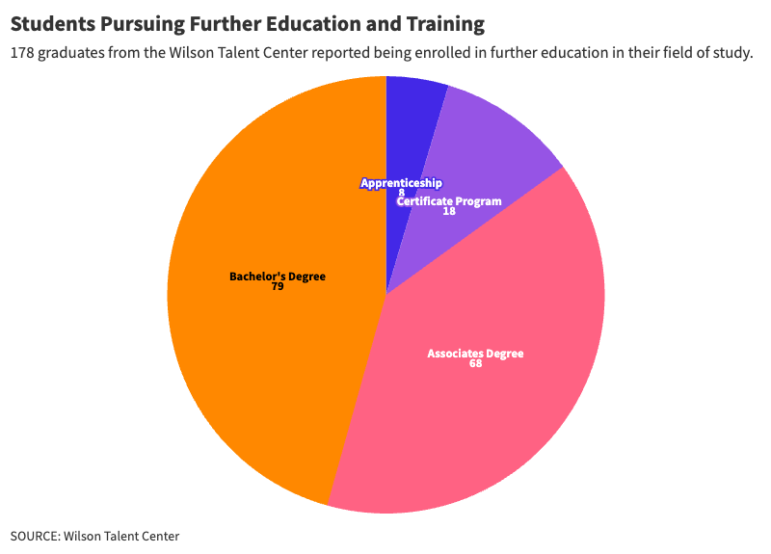
Kenzie Terpstra
Wilson Talent Center graduates pursuing further education or trainingBy KENZIE TERPSTRA
Capital News Service
LANSING – Despite the steady decline in unemployment rates over the last six months, Michigan is still battling a labor shortage across most industries, especially skilled trades.
Businesses across Michigan need highly skilled workers in sectors such as agriculture, construction, energy , manufacturing and other fields, experts say.
The unemployment rate in the state, as of July 31, was 3.6%, according to the U.S. Department of Labor.
According to the Michigan Department of Labor and Economic Opportunity, skilled trade positions will account for about 47,000 annual job openings through 2028.
Those positions in the state’s Bureau of Labor Market Information’s Hot 50 Job Outlook include electricians, truck drivers, plumbers, pipefitters and other occupations that do not require a four-year college degree.
“We have drifted away from encouraging or fostering the idea for young kids to go into the trades,” said Kevin Koehler, the president of the Construction Association of Michigan. “Trade classes in school – wood shop, auto shop – those are being discontinued.”
The association, based in Bloomfield Township, is an industry advocacy group whose member companies employed over 189,000 people in February, with projected increases in the number of workers in the coming years, according to Koehler.
“Tradesmen learn skills that you have for the rest of your life, and you can go to school without debt, unlike most college (students). You can get paid to go to school and learn the trades through programs,” said Koehler, citing a need to promote such training.
Going PRO in Michigan, funded by the state through the Department of Labor and Economic Growth’s Going PRO Talent Fund, is one such program.
It helps individuals secure employment, industry-recognized credentials and strong wages by providing training grants to Michigan businesses to support employees in high-demand trade industries.
Since its inception in 2014, the fund has helped more than 6,000 businesses train about 170,000 workers, according to the department.
Jamie Engel, the career and technical education director of Ingham Intermediate School District’s Wilson Talent Center in Mason, said, discouraging people from going into a skilled trade or apprenticeship dates back to the early 2000s with the federal No Child Left Behind Act.
Instead, people were told they “really needed to have a bachelor’s degree to be successful,” said Engel, adding that such messaging “really hurt different trades and parts of our economy.”
The Wilson Talent Center offers career and technical education programming for high school juniors and seniors, featuring 20 programs in 12 career areas. Students can earn high school academic credit, free college credit and state or national certification, according to its website.
Over the past decade, the center has seen more students participating in its programs. It has over 900 students enrolled this school year.
According to Engel, 103 of its graduates reported having full-time employment in their program field last fall. Another 178 students said that they were pursuing post-secondary programs ranging from apprenticeships to bachelor’s degrees.
“We’ve got some fabulous instructors doing great things, and we have a lot of businesses helping support that by getting kids into their businesses right out of high school,” Engel said.
Despite the growing interest in such training, the skilled trade shortage is far from over, Koehler said.
“Four out of five current tradesmen will retire in the next 10 years,” Koehler said.
According to Manpower’s Talent Shortage Survey, the average age for trades workers throughout the United States is around 55.
Engel said, “People retiring – you know, there’s not a backfill in there. People are moving out to retirement and there are not enough people to fill those positions – it just keeps getting worse and worse.”
As for possible short-term solutions to the skilled trade shortage, Koehler said there’s a need to “do a better job promoting the programs that exist and educate parents and school counselors that these are high-paying jobs for a career.”
And Engel said, “We need to do quality career development for kids – a combination of career development based on their unique skill set and adding opportunities for schools and employers to engage with students to show them the possibilities.”
Gov. Gretchen Whitmer earlier this year proclaimed May as Professional Trades Month to honor workers in those fields and to encourage Michigan residents to explore educational and career opportunities, according to Labor and Economic Growth.
Whitmer said programs such as the Going PRO Talent Fund and State Apprenticeship Expansion are “putting tens of thousands of people on paths to support themselves and their families.”